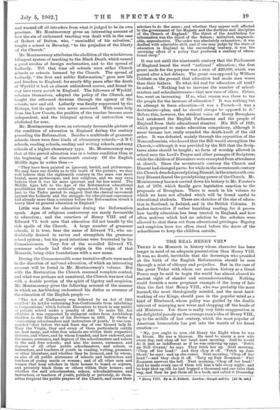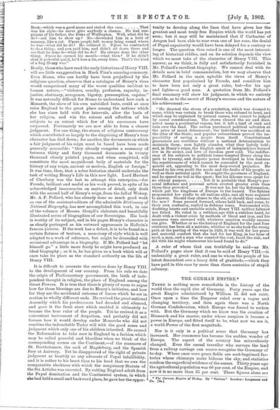THE REAL HENRY
THERE is no Monarch in history whose character has been
longer in need of an adequate presentation than Remy VIII. It was, no doubt, inevitable that the Sovereign who presided at the birth of the English Reformation should be seen through a mist of obloquy and prejudice. But in the case of the great Tudor with whom our modern history as a Great Power may be said to begin the world has almost abused its ancient right of Blander and misunderstanding. Nothing could furnish a more pregnant example of the irony of fate than the fact that Henry VIII., who was probably the most learned, the most theologically minded, and the most hard- working of our Kings, should pass in the popular mind as a kind of Bluebeard, whose policy was guided by the double interest of marrying new wives and chopping off the beads of old Ministers. Yet there is really very little exaggeration in the delightful parody on the average man's idea of Henry VIII., up to the middle of last century, which the most popular of American humourists has put into the mouth of his finest creation :—
"My, you ought to seen old Henry the Eight when he was in bloom. He was a blossom. He used to marry a new wife every day, and chop off her head next morning. And he would do it just as indifferent as if he was ordering up eggs. 'Fetch up Nell Gwynn,' he says. They fetch her up. Next morning, Chop off her head And they chop it off. 'Fetch up Jane Shore,' he says : and up she comes. Next morning, 'Chop off her head !'—and they chop it off. ' Rirg up Fair Rosamun.' Fair Rosamun answers the bell. Next morning, 'Chop off her head!' And he made every one of them tell him a tale every night; and he kept that up tat he had hogged a thousand and one tales that way, and then he put them all in a book, and called it Domesday • Henry VIII. By A. F. Pollard. London Goupil sad Co. [12 nat.] Book—which was a good name and stated the case That
was his style—he never give anybody a chance. He had sus- picions of his father, the Duke of Wellington. Well, what did he do ?—ask him to show up? No—drovrnded him in a butt of mamsey, like a cat. S'pose people left money lying round where he was—what did he do? He collared it. S'pose he contracted to do a thing; and you paid him, and didn't sit down there and see that he done it—what did he do? He always done the other thing. S'pose he opened his mouth—what then? If he didn't shut it powerful quick, he'd lose a lie, every time. That's the kind of a bug Henry was."
Really, those who have read the early historians of Henry VIII. will see little exaggeration in Huck Finn's amusing summary. Even Hume, who can hardly have been prejudiced by the religious question, observes that a catalogue of Henry's vices would comprehend many of the worst qualities incident to human nature,—" violence, cruelty, profusion, rapacity, in- justice, obstinacy, arrogance, bigotry, presumption, caprice." It was naturally difficult for Hume to understand how such a Monarch, the slave of his own unbridled lusts, could at once raise England to the great place among the nations which she has since held with few intervals, alter the basis of her religion, and win the esteem and affection of his subjects to an extent which few of his successors have
surpassed. Fortunately we are now able to form a clearer judgment. For one thing, the storm of religious controversy
which contributed so largely to the disguising of Henry's true character has died down ; for another, the documents on which a fair judgment of his reign must be based have been made generally accessible: "they already comprise a summary of between thirty and forty thousand documents in twenty thousand closely printed pages, and when completed, will constitute the most magnificent body of materials for the
history of any reign, ancient or modern, English or foreign." It was time, then, that a sober historian should undertake the
task of writing Henry's Life in this new light. Lord Herbert of Cherbury was the last to attempt this enterprise,—for Froude, brilliant and useful as his work proved, in spite of its acknowledged inaccuracies on matters of detail, only dealt with the second half of Henry's reign, from the fall of Wolsey. Mr. A. F. Pollard, who has already done so much good work as one of the assistant-editors of the admirable Dictionary of National Biography, has now accomplished this work, in one of the volumes of Messrs. Goupil's elaborate and beautifully illustrated series of biographies of our Sovereigns. His book is worthy of its subject, and in his pages Henry's character is
as clearly portrayed as his outward appearance in Holbein's famous picture. If the work has a defect, it is to be found in a certain flatness of texture, a monotony of style which is well adapted to a work of reference, but might be diversified with occasional advantage in a biography. If Mr. Pollard had "let himself go" a little more freely he might have produced an ideal biography ; as it is, he has given us a book which will at once take its place as the standard authority on the life of Henry VIII.
It is difficult to overrate the services done by Henry VIII. to the development of our country. From his rule we date the origin of Parliamentary government, the birth of inde- pendent thought in religion, the place of England among the
Great Powers. It is true that there is plenty of room to argue how far these blessings are due to Henry's initiative, and how far they are the accidental outcome of forces which he set in motion to wholly different ends. He revived the great national Assembly which his predecessors had dreaded and silenced, and gave it the fresh start which enabled it ultimately to become the true ruler of the people. Yet he revived it as a convenient instrument of despotism, and probably did not
foresee how it would develop under Monarchs who did not combine the indomitable Tudor will with the good sense and judgment which only one of his children inherited. He caused the Reformation to take root in England in a fashion which may be called peaceful and bloodless when we think of the corresponding scenes on the Continent,—of the massacre of St. Bartholomew, the sack of Magdeburg, and the Spanish fury at Antwerp. Yet he disapproved of the right of private judgment as heartily as any advocate of Papal infallibility, and it is rather to his heart than to his head that we owe the comparative slackness with which the sanguinary Statute of the Six Articles was executed. By cutting England adrift from the Papal domination and the Continental system, in which she had held a small and backward place, he gave her the oppor- tunity to develop along the lines that have given her the greatest and most truly free Empire which the world has yet seen; but it may still be maintained that if Catharine of Aragon had been able to rear even one of her sons, the denial of Papal superiority would have been delayed for a century or longer. The question thus raised is one of the most interest- ing of historical riddles, and on its solution depends the view which we must take of the character of Henry VIII. This answer, as we think, is fully and satisfactorily furnished in Mr. Pollard's excellent biography. We cannot deal with its details save in brief commendation, but we may observe that Mr. Pollard in the main upholds the views of Henry's character first popularised by Froude, and considers him to have been not only a great ruler, but—for his age and lights—a good man. A quotation from Mr. Pollard's final summary will show his judgment, in which we entirely coincide, as to the secret of Henry's success and the nature of
his achievement :—
" He directed the storm of a revolution, which was doomed to come, which was certain to break those who refused to bend, and which may be explained by natural causes, but cannot be judged by moral considerations. The storm cleared the air and dissi- pated many a pestilential vapour, but it left a trail of rack and ruin over the land. The nation purchased political salvation at the price of moral debasement; the individual was sacrificed on the altar of the State; and popular subservience proved the im- possibility of saving a people from itself. Constitutional guarantees are worthless without a national determination to maintain them; men lightly abandon what they lightly hold ; and, in Henry's reign, the English spirit of independence burned low in its socket, and love of freedom grew cold. The indiffer- ence of his subjects to political issues tempted Henry along the path to tyranny, and despotic power developed in him features the repulsiveness of which cannot be concealed by the most ex- quisite art, appealing to the most deep-rooted prejudice. He turned to his own profit the needs and the faults of his people, as well as their national spirit He sought the greatness of England, and he spared no toil in the quest; but his labours were spent for no ethical purpose Yet it is probable that Henry's per- sonal influence and personal action averted greater evils than those they provoked. It was not he, but the Reformation, which put the kingdoms of Europe to the hazard. The Sphinx propounded her riddle to all nations alike, and all were required to answer. Should they cleave to the old, or should they embrace the new? Some pressed forward, others held back, and some, to their own confusion, replied in dubious tones. Surrounded with doubting hearts and unstable minds, Henry VIII. neither faltered nor failed. He ruled in a ruthless age with a ruthless hand, he dealt with a violent crisis by methods of blood and iron, and his measures were crowned with whatever sanction worldly success can give. Whether or no the history of England for the past four centuries has been all a mistake, whether or no she took the wrong path at the parting of the ways in 1529, it was well for her peace and material comfort that she had for her King, in her hour of need, a man, and a man who counted the cost, faced the risk, and did with his might whatsoever his hand found to do."
A ruler of whom that can truthfully be said—as Mr. Pollard's pages show that it can be said of Henry
undeniably a great ruler, and one to whom the people of his latest descendant owe a heavy debt of gratitude,—which they have paid in this case by more than three centuries of stupid calumny.















































 Previous page
Previous page